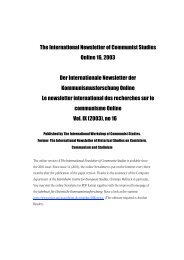The International Newsletter of Communist Studies Online
The International Newsletter of Communist Studies Online
The International Newsletter of Communist Studies Online
Sie wollen auch ein ePaper? Erhöhen Sie die Reichweite Ihrer Titel.
YUMPU macht aus Druck-PDFs automatisch weboptimierte ePaper, die Google liebt.
XII (2006), no 19 59<br />
1960. <strong>The</strong> gaps between the discourse <strong>of</strong> the state and the life <strong>of</strong> citizens, and how social<br />
work institutions try to fill them, appear also in the case study by Elena Iarskaia-Smirnova and<br />
Pavel Romanov about the children’s home „Krasnyi gorodok“ (Red small town). A similar study<br />
for the Kozma-Street Settlement, by Dorottya Szikra and Eszter Varsa, analyzes the<br />
differentiation (based on gender, class, and ethnicity) in the practice <strong>of</strong> social work in<br />
Hungary between 1935 and 1945.<br />
<strong>The</strong> third part addresses aspects <strong>of</strong> the interrelations between social policies and social<br />
movements in Bulgaria, Slovenia, Latvia, Poland and Hungary. Milena Angelova sheds some<br />
light on the interrelations between private welfare activities and the growing responsibility <strong>of</strong><br />
the state in her study <strong>of</strong> the fight against tuberculosis between 1908 and 1948. Vesna<br />
Leskošek recalls the importance <strong>of</strong> the feminist movement for the development <strong>of</strong> social work<br />
in Slovenia in the period preceeding World War II. <strong>The</strong> different self-help organizations <strong>of</strong> the<br />
Latvian Jewish community between 1900 and 1940 are the object <strong>of</strong> the contribution by Juris<br />
Osis and Liesma Ose. <strong>The</strong> consequences <strong>of</strong> legislation and demographic evolutions on the<br />
Latvian Jewish minority are observed in two cities. Izabela Szczeopaniak-Wiecha, Agnieszka<br />
Malek and Krystyna Slany oberve the system <strong>of</strong> abandoned child care in Poland, focussing on<br />
the foster family as the oldest form <strong>of</strong> care for deprived children. Eszter Varsa analyses the<br />
ethnic differentiations operated by the first maternity leave regulation in Hungary, between<br />
1960 and 1980.<br />
<strong>The</strong> fourth part recalls the history <strong>of</strong> the pr<strong>of</strong>essionalisation <strong>of</strong> social work in Romania and<br />
Slovenia. <strong>The</strong> development <strong>of</strong> the vocational training systems for nurses and midwives, in<br />
interwar Romania, is recalled and analyzed by Silvana Rachieru. She underlines the particular<br />
significance <strong>of</strong> the establishment <strong>of</strong> the „Principesa Ilena Superior School for Social<br />
Assistance“ in 1929. Finally, the history <strong>of</strong> Slovenian vocational training from 1940 and 1960 is<br />
the object <strong>of</strong> the last essay <strong>of</strong> this section. Darja Zaviršek shows how the state played a<br />
crucial role, considering social workers as necessary, albeit transitional, for the construction<br />
<strong>of</strong> the „socialist society“.<br />
In the final essay <strong>of</strong> the book, co-editor Dagmar Schulte synthesises the similarities and<br />
differences in the foundation, the pr<strong>of</strong>essionalisation, the main targets, the daily routine and<br />
the specificities <strong>of</strong> social work in these countries.<br />
<strong>The</strong> unconventional time period adopted by the initiators and researchers <strong>of</strong> this project,<br />
refusing the secure political periodizations to the benefit <strong>of</strong> less definite boundaries, is<br />
crucial in making many <strong>of</strong> the essays published here important contributions for the study <strong>of</strong><br />
European pr<strong>of</strong>essional welfare. <strong>The</strong>y are a salutary effort to enlighten an unknown field <strong>of</strong><br />
comparative social historical research on the eastern bloc but also to stress the important<br />
continuities with pre-war years developments in these countries, without silencing the<br />
discontinuities. „Need and Care“ <strong>of</strong>fers some useful tools in the writing <strong>of</strong> a contemporary<br />
social history <strong>of</strong> Western and Eastern Europe.<br />
Mathieu Denis, Berlin.














